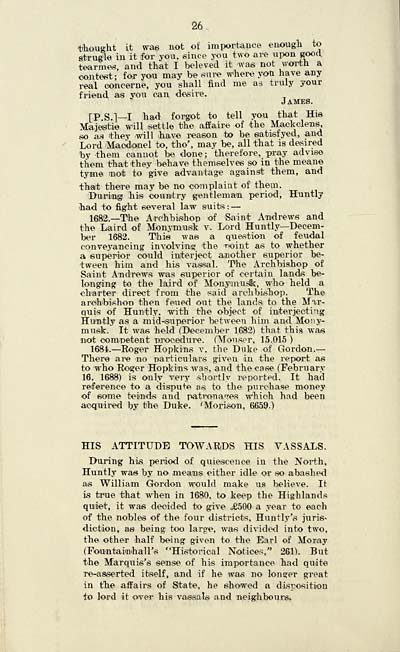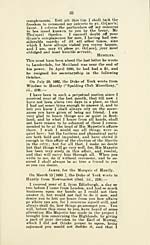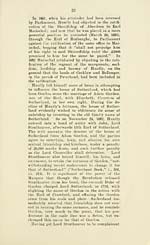1st Duke of Gordon
(30) Page 26
Download files
Complete book:
Individual page:
Thumbnail gallery: Grid view | List view

26
thought it was not of importance enough to
strugle in it for you, since you two are upon good
tearmes, and that I beleved it was not worth a
contest; for you may be sure where you have any
real concerne, you shall find me as truly your
friend as you can desire.
James.
[P.S.I— I had forgot to tell you that His
Ma-jesitie will settle the affaire of the Mackclens,
so as they -will have reason to be eatisfyed, and
Lord 'Macdonel to, tho\ may be, all that is desired
by them cannot be done; therefore, pray advise
them that they behave themselves so in the meane
tyme mot to 'give advantage against them, and
that there may be no complaint of them.
During his country gentleman period, Huntly
had to fight several law suits: —
1682.— The Archbishop .of Saint Andrews and
the Laird of Monynrask v. Lord Huntly— Decem-
ber 1682. This was a question of feudal
conveyancing involving 1 the no hit as to whether
a superior could interject another superior be-
tween him and his vassal. The Archbishop of
Saint Andrews was superior of certain lands be-
longing to the laird of Monymuslk, who held a
charter direct from the said archbishop. The
arch'bishoo then feued out the lands to the Mar-
quis of Huntly, with the object of in>tei*jecti:ig
Huntly as a mid-superior between him and Mony-
musk.' It was held (December 1682) that this was
not competent procedure, (Mouse r, 15.015 )
1684. — Roger Hopkins v. the Duke of Gordon. —
There are no particulars given in the report as
to who Roger Hopkins was, and the case (February
16. 1688) is only very shortly reported. It had
reference to a dispute as to the purchase money
of some teinds and patronages which had been
acquired by the Duke. 'Morison, 6659.)
HIS ATTITUDE TOWARDS HIS VASSALS.
During his period of quiescence in the North,
Huntly was by no means either idle or so abashed
as William Gordon would make us believe. It
is true that when in 1680, to keep the Highlands
quiet, it was decided to give ,£500 a year to each
of the nobles of the four districts, Huntly's juris-
diction, as being too large, was divided into two,
the other half being given to the Earl of Moray
(FountainhalFs "Historical Notices," 261). But
the Marquis's sense of his importance had quite
re-asserted itself, and if he was no longer great
in the affairs of State, he showed a disposition
to lord it over his vassals and neighbours*
thought it was not of importance enough to
strugle in it for you, since you two are upon good
tearmes, and that I beleved it was not worth a
contest; for you may be sure where you have any
real concerne, you shall find me as truly your
friend as you can desire.
James.
[P.S.I— I had forgot to tell you that His
Ma-jesitie will settle the affaire of the Mackclens,
so as they -will have reason to be eatisfyed, and
Lord 'Macdonel to, tho\ may be, all that is desired
by them cannot be done; therefore, pray advise
them that they behave themselves so in the meane
tyme mot to 'give advantage against them, and
that there may be no complaint of them.
During his country gentleman period, Huntly
had to fight several law suits: —
1682.— The Archbishop .of Saint Andrews and
the Laird of Monynrask v. Lord Huntly— Decem-
ber 1682. This was a question of feudal
conveyancing involving 1 the no hit as to whether
a superior could interject another superior be-
tween him and his vassal. The Archbishop of
Saint Andrews was superior of certain lands be-
longing to the laird of Monymuslk, who held a
charter direct from the said archbishop. The
arch'bishoo then feued out the lands to the Mar-
quis of Huntly, with the object of in>tei*jecti:ig
Huntly as a mid-superior between him and Mony-
musk.' It was held (December 1682) that this was
not competent procedure, (Mouse r, 15.015 )
1684. — Roger Hopkins v. the Duke of Gordon. —
There are no particulars given in the report as
to who Roger Hopkins was, and the case (February
16. 1688) is only very shortly reported. It had
reference to a dispute as to the purchase money
of some teinds and patronages which had been
acquired by the Duke. 'Morison, 6659.)
HIS ATTITUDE TOWARDS HIS VASSALS.
During his period of quiescence in the North,
Huntly was by no means either idle or so abashed
as William Gordon would make us believe. It
is true that when in 1680, to keep the Highlands
quiet, it was decided to give ,£500 a year to each
of the nobles of the four districts, Huntly's juris-
diction, as being too large, was divided into two,
the other half being given to the Earl of Moray
(FountainhalFs "Historical Notices," 261). But
the Marquis's sense of his importance had quite
re-asserted itself, and if he was no longer great
in the affairs of State, he showed a disposition
to lord it over his vassals and neighbours*
Set display mode to:
![]() Universal Viewer |
Universal Viewer | ![]() Mirador |
Large image | Transcription
Mirador |
Large image | Transcription
Images and transcriptions on this page, including medium image downloads, may be used under the Creative Commons Attribution 4.0 International Licence unless otherwise stated. ![]()
| Histories of Scottish families > 1st Duke of Gordon > (30) Page 26 |
|---|
| Permanent URL | https://digital.nls.uk/91797536 |
|---|
| Description | A selection of almost 400 printed items relating to the history of Scottish families, mostly dating from the 19th and early 20th centuries. Includes memoirs, genealogies and clan histories, with a few produced by emigrant families. The earliest family history goes back to AD 916. |
|---|

